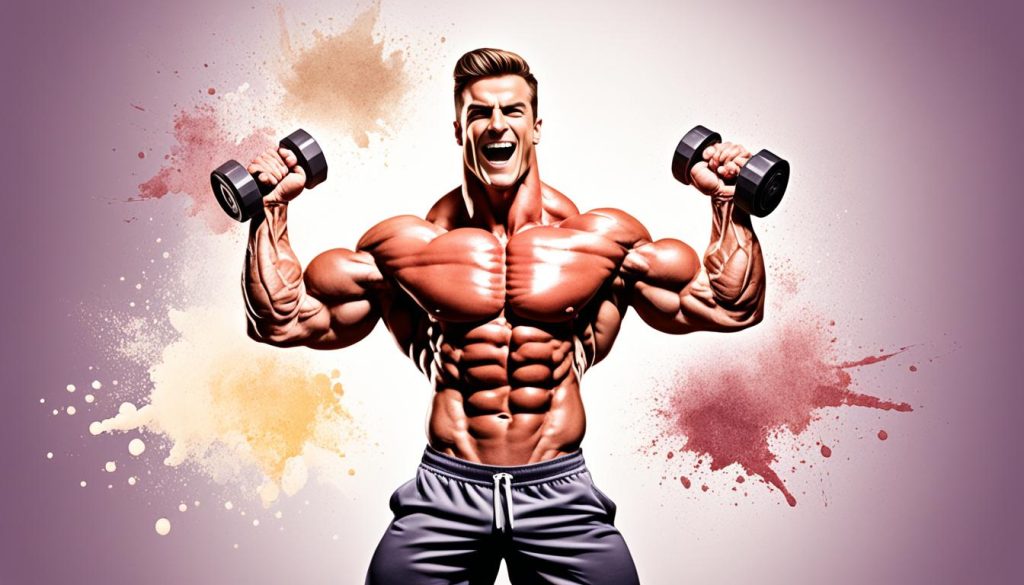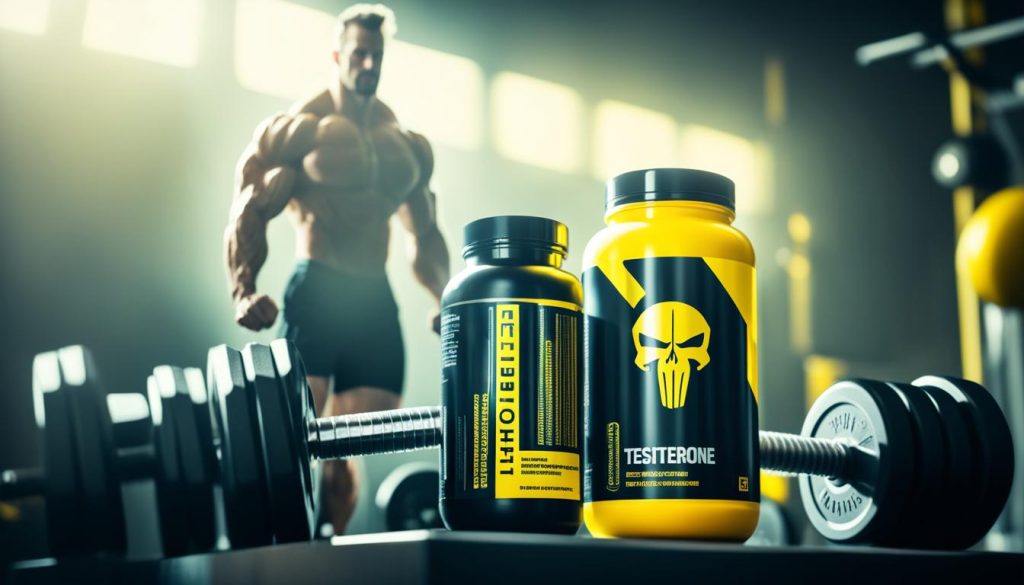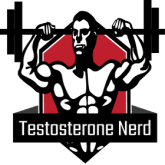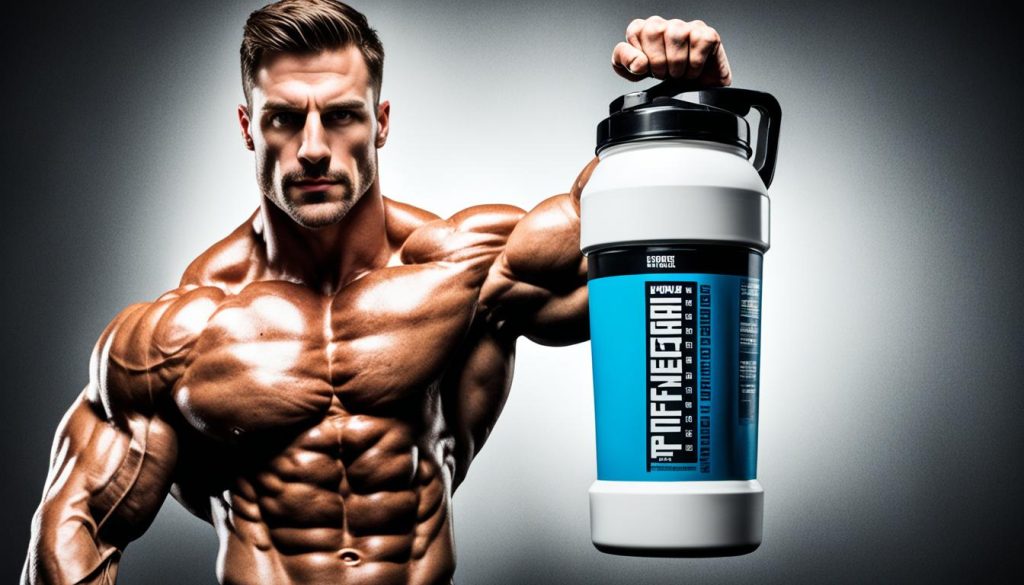Did you know that whey protein is the most popular protein supplement among fitness enthusiasts and bodybuilders? It’s known for its ability to promote muscle building and aid in exercise recovery. But here’s the surprising part: there is a common belief that whey protein can actually boost testosterone levels, a hormone crucial for muscle synthesis and overall health. In this article, I will explore the relationship between whey protein and testosterone levels to determine if it’s based on fact or just a myth.
Key Takeaways:
- Whey protein is a popular protein supplement among fitness enthusiasts and bodybuilders.
- There is a common belief that whey protein can boost testosterone levels.
- In this article, we will explore the relationship between whey protein and testosterone levels.
- We will provide a comprehensive overview of whey protein and its benefits for muscle building and recovery.
- We will examine scientific evidence to determine if whey protein does indeed boost testosterone levels.
Whey Protein: A Comprehensive Overview
In this section, I will provide a comprehensive overview of whey protein. We will discuss its origin and composition, highlighting the essential amino acids it contains. Additionally, we will explore the benefits of whey protein for muscle building and recovery. Finally, we will delve into the diverse forms of whey protein supplements available in the market.
Origin and Composition of Whey Protein
Whey protein is a high-quality protein derived from milk during the cheese-making process. It is a byproduct that separates from the curd, leaving behind the liquid whey. This liquid is then processed to remove water, lactose, and fat, resulting in a concentrated form of whey protein.
Whey protein is composed of various essential and non-essential amino acids, making it a complete protein source. It contains all nine essential amino acids that the body cannot produce on its own and needs to obtain from the diet. These amino acids play a crucial role in muscle synthesis, repair, and overall health.
Benefits for Muscle Building and Recovery
One of the significant benefits of whey protein is its role in muscle building and recovery. Due to its high amino acid content, whey protein stimulates protein synthesis, which is essential for muscle growth and repair after exercise.
Consuming whey protein before or after workouts can enhance muscle protein synthesis, leading to increased muscle mass and strength over time. It also helps reduce muscle damage and inflammation, allowing for faster recovery and improved exercise performance.
Diverse Forms of Whey Protein Supplements
Whey protein supplements come in various forms to cater to individual preferences and dietary needs. The most common forms include:
- Whey Protein Concentrate: This form contains around 70-80% protein per serving. It also retains some of the natural fats and carbohydrates found in whey.
- Whey Protein Isolate: This form undergoes further processing to remove more fat and lactose, resulting in a higher protein content of around 90-95% per serving.
- Whey Protein Hydrolysate: This form is partially pre-digested, making it easier for the body to absorb and utilize. It is often the preferred choice for individuals with digestive issues.
These different forms of whey protein offer flexibility in terms of nutritional content and texture, allowing individuals to choose the option that best suits their dietary goals and preferences.
Does Whey Protein Boost Testosterone?
One common claim about whey protein is its ability to boost testosterone levels. Testosterone plays a crucial role in muscle synthesis and overall health, making it an important hormone for individuals looking to build muscle and enhance their fitness levels. However, it is essential to examine the scientific evidence supporting or refuting these claims before drawing any conclusions.
Research studies have explored the relationship between whey protein and testosterone levels, aiming to determine if there is a direct impact. While some studies have suggested potential testosterone-boosting effects of whey protein supplementation, the results are not consistent across the board. It is important to note that the majority of these studies have been conducted on specific populations, such as older men or athletes, limiting their generalizability.
Furthermore, the precise mechanism by which whey protein may influence testosterone levels remains unclear. Some experts theorize that whey protein’s beneficial effects on muscle building and recovery may indirectly support testosterone production. However, more research is needed to substantiate these claims.
In conclusion, while there is ongoing research exploring the relationship between whey protein and testosterone, the scientific evidence is inconclusive. It is important to approach claims of testosterone-boosting effects with caution and consider other factors that impact testosterone levels, such as exercise, diet, and overall lifestyle.
For individuals interested in optimizing their testosterone levels, it is recommended to consult with a healthcare professional or a registered dietitian who specializes in sports nutrition. They can provide personalized guidance and help develop a comprehensive approach based on individual needs and goals.

Understanding Testosterone Levels and Their Impact on Fitness
In order to grasp the relationship between testosterone levels and fitness, it is crucial to understand the role hormones play in muscle synthesis and overall health. Testosterone, a hormone primarily produced in the testes in males and in smaller amounts in the ovaries and adrenal glands in females, is commonly associated with traits such as increased muscle mass, strength, and libido.
Testosterone plays a vital role in the process of muscle synthesis, as it helps regulate protein synthesis and promotes muscle growth and repair. It also contributes to bone density, red blood cell production, and the distribution of body fat. Proper testosterone levels are essential for maintaining optimal physical performance and overall health.
However, it is important to note that testosterone levels naturally decline with age. This decline can lead to decreased muscle mass, strength, and energy levels, as well as an increased risk of certain health conditions. Therefore, many individuals, particularly those involved in fitness and bodybuilding, look for ways to boost their testosterone levels.
Role of Hormones in Muscle Synthesis and Health
Hormones, including testosterone, have a significant impact on muscle synthesis. When testosterone binds to specific receptors in muscle cells, it stimulates protein synthesis, which is essential for muscle growth and repair. In turn, this helps enhance strength and endurance, allowing individuals to achieve better fitness outcomes.
Besides its role in muscle synthesis, testosterone also plays a crucial role in overall health. It helps regulate mood, cognition, and cardiovascular function. It is involved in the production of red blood cells and promotes bone density, reducing the risk of osteoporosis and fractures.
Natural Testosterone Boosters vs. Supplements
Many individuals seek ways to naturally increase their testosterone levels. Natural testosterone boosters include lifestyle modifications like maintaining a balanced diet, exercising regularly (particularly weightlifting and high-intensity interval training), getting enough sleep, managing stress levels, and avoiding excessive alcohol consumption.
There are also specific foods and herbs that are believed to have testosterone-boosting properties, such as ginger, ashwagandha, pomegranate, and zinc-rich foods like oysters, pumpkin seeds, and beef.
However, it is important to note that the effectiveness of natural testosterone boosters may vary among individuals. Furthermore, scientific evidence supporting the efficacy of such methods is limited, and the impact of these boosters on testosterone levels may be modest.
Alternatively, testosterone supplements may be prescribed by healthcare professionals to individuals with clinically low testosterone levels. These supplements are available in various forms, including gels, patches, injections, and capsules. Testosterone supplementation should only be utilized under the guidance and supervision of a healthcare professional, as misuse or abuse can have adverse effects on health.
It is worth noting that while testosterone boosters and supplements may have potential benefits, they are not a substitute for a healthy lifestyle. A well-rounded approach that includes proper nutrition, regular exercise, adequate sleep, stress management, and overall good health practices is key for optimizing testosterone levels and attaining fitness goals.

| Natural Testosterone Boosters | Testosterone Supplements | |
|---|---|---|
| Efficacy | Varies among individuals Scientific evidence limited |
Prescribed for clinically low testosterone levels Under healthcare professional guidance |
| Method | Lifestyle modifications, diet, herbs | Gels, patches, injections, capsules |
| Potential Side Effects | Minimal Varies among individuals |
Possible adverse effects when misused or abused |
| Role in Fitness | Potential benefits, but not a substitute for healthy lifestyle | Potential benefits when used properly under guidance |
Myths vs. Science: Separating Fact from Fiction in Protein Supplementation
In this section, I will address common myths and misconceptions surrounding whey protein supplementation. There are often misconceptions and false information spread about the effects of whey protein on the body. However, it is important to separate fact from fiction and rely on scientific research for authentic information.
Debunking Common Misconceptions about Whey Protein
One common myth about whey protein is that it will make you gain weight and get bulky. However, the truth is that whey protein is a valuable tool for muscle building and recovery. It provides essential amino acids that support muscle growth and repair, but it does not automatically lead to excessive weight gain. The overall impact on body weight will depend on an individual’s overall calorie intake and exercise regimen.
Another misconception is that whey protein is only for bodybuilders. While it is true that bodybuilders often utilize whey protein to support their muscle building goals, whey protein can be beneficial for anyone looking to enhance their exercise performance and recovery. It can help individuals of all fitness levels meet their protein needs and improve their overall health.
Additionally, it is often believed that whey protein can disrupt hormonal balance. However, scientific research has shown that whey protein does not have a significant impact on hormonal balance in healthy individuals. It is a safe and effective protein source that can be included as part of a balanced diet.
Scientific Research on Whey Protein and Hormonal Balance
Several scientific studies have been conducted to explore the relationship between whey protein and hormonal balance. These studies consistently conclude that whey protein consumption does not have adverse effects on hormone levels in healthy individuals. Whey protein is rapidly absorbed by the body and stimulates muscle protein synthesis, but it does not disrupt the delicate hormonal balance of the body.
It is important to rely on evidence-based information when considering whey protein supplementation. Scientific research provides valuable insights into the effects of whey protein on the body, helping to dispel myths and misconceptions.
By understanding and debunking these common misconceptions and examining the scientific research on whey protein, you can make informed decisions about incorporating whey protein into your fitness and nutrition routine.
Conclusion
In conclusion, after an extensive examination of the relationship between whey protein and testosterone levels, we can confidently say that whey protein does not boost testosterone. While whey protein is a highly beneficial nutritional supplement for muscle building and exercise recovery, it does not directly impact testosterone production in the body.
Throughout this article, we explored the origin and composition of whey protein, highlighting its essential amino acids and the diverse forms of whey protein supplements available. We also discussed the benefits of whey protein for muscle building and recovery, emphasizing its role in providing essential nutrients and aiding in exercise-induced muscle synthesis.
Furthermore, we delved into the scientific evidence surrounding whey protein and testosterone, debunked common misconceptions, and clarified the impact of testosterone levels on fitness. It is crucial to understand that while testosterone plays a crucial role in muscle synthesis and overall health, its production is influenced by various factors, but whey protein supplementation alone does not directly boost testosterone levels.
In conclusion, whey protein is an effective supplement for individuals looking to enhance their muscle building and exercise recovery. However, if you are specifically seeking to increase your testosterone levels, it is recommended to explore other avenues such as natural testosterone boosters or consult with a healthcare professional for personalized advice.
I've been fascinated by natural male hormone optimization since 2016. And ever since I've been going through boatloads of different meta-analyses and scientific data associated with increasing testosterone levels naturally. I hold a PhD degree in public health and have 10+ scientific publications on Google Scholar. Thus, in my collective work here you'll find helpful tricks, natural remedies, detailed product reviews (including stuff I've personally tried)... and more!



